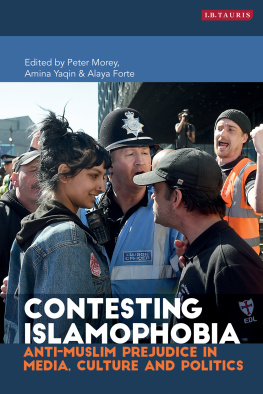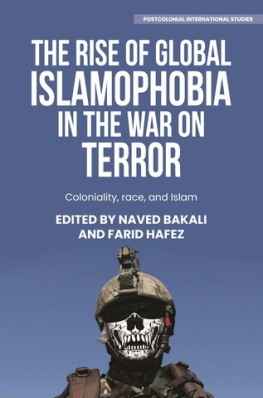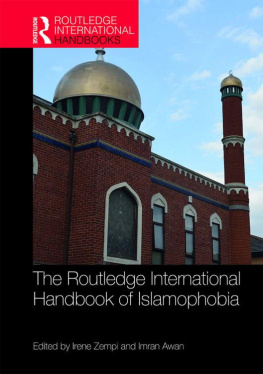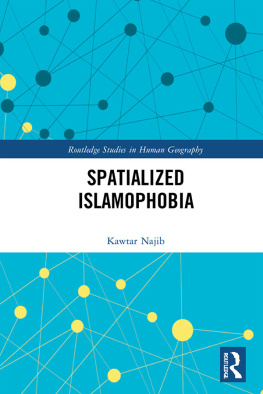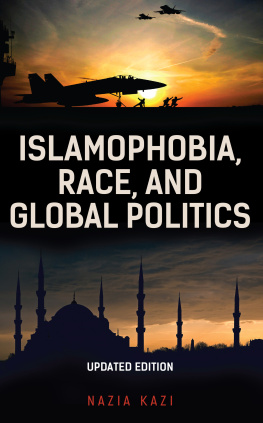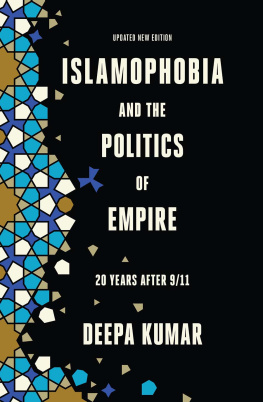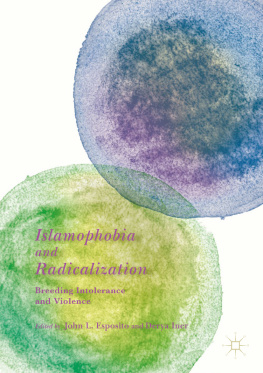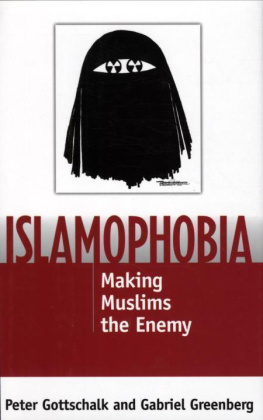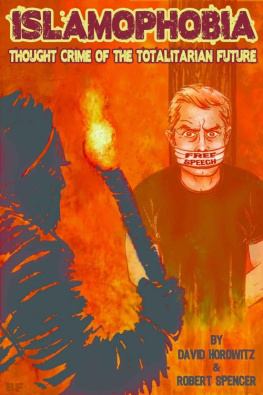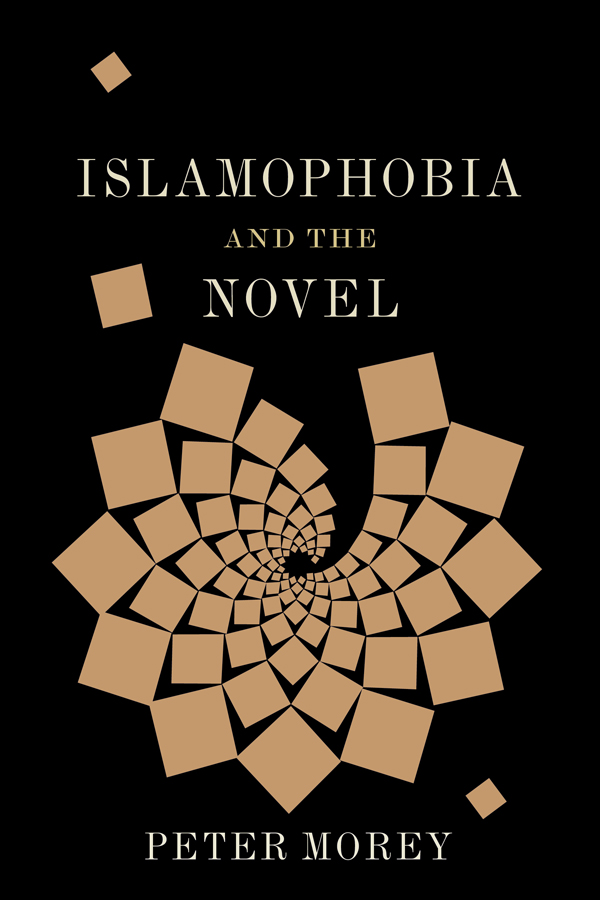Contents
Guide
Pagebreaks of the print version
ISLAMOPHOBIA AND THE NOVEL
LITERATURE NOW
LITERATURE NOW
Matthew Hart, David James, and Rebecca L. Walkowitz, Series Editors
Literature Now offers a distinct vision of late-twentieth- and early-twenty-first-century literary culture. Addressing contemporary literature and the ways we understand its meaning, the series includes books that are comparative and transnational in scope as well as those that focus on national and regional literary cultures.
Caren Irr, Toward the Geopolitical Novel: U.S. Fiction in the Twenty-First Century
Heather Houser, Ecosickness in Contemporary U.S. Fiction: Environment and Affect
Mrinalini Chakravorty, In Stereotype: South Asia in the Global Literary Imaginary
Hctor Hoyos, Beyond Bolao: The Global Latin American Novel
Rebecca L. Walkowitz, Born Translated: The Contemporary Novel in an Age of World Literature
Carol Jacobs, Sebalds Vision
Sarah Phillips Casteel, Calypso Jews: Jewishness in the Caribbean Literary Imagination
Jeremy Rosen, Minor Characters Have Their Day: Genre and the Contemporary Literary Marketplace
Jesse Matz, Lasting Impressions: The Legacies of Impressionism in Contemporary Culture
Ashley T. Shelden, Unmaking Love: The Contemporary Novel and the Impossibility of Union
Theodore Martin, Contemporary Drift: Genre, Historicism, and the Problem of the Present
Zara Dinnen, The Digital Banal: New Media and American Literature and Culture
Gloria Fisk, Orhan Pamuk and the Good of World Literature
ISLAMOPHOBIA
AND THE
NOVEL

PETER MOREY
Columbia University Press / New York
Columbia University Press
Publishers Since 1893
New York Chichester, West Sussex
cup.columbia.edu
Copyright 2018 Columbia University Press
All rights reserved
E-ISBN 978-0-231-54133-6
Library of Congress Cataloging-in-Publication Data
Names: Morey, Peter author.
Title: Islamophobia and the novel / Peter Morey.
Description: New York : Columbia University Press, 2018. | Series: Literature now | Includes bibliographical references and index.
Identifiers: LCCN 2017055403 | ISBN 9780231177740 (cloth : alk. paper)
Subjects: LCSH: Islamophobia in literature. | Fiction20th centuryHistory and criticism. | Fiction21st centuryHistory and criticism. | Muslims in literature.
Classification: LCC PN3352.I83 M57 2018 | DDC 809.3/938297dc23
LC record available at https://lccn.loc.gov/2017055403
A Columbia University Press E-book.
CUP would be pleased to hear about your reading experience with this e-book at .
Cover design and art: Lisa Hamm
For Bart Moore-Gilbert,
scholar, mentor, friend
CONTENTS
I have lived with this book for so long that it is both a relief and a wrench to see it make its way out into the world. The work contained here is the culmination of a particular phase of research into the cultural representation of Muslims that has lasted more than a decade. First in the Framing Muslims project funded by the Arts and Humanities Research Council and subsequently in the Muslims, Trust, and Cultural Dialogue project made possible with support from the Research Councils UK, I have tried to understand the way in which the discursive framing of Muslims as a problem takes its shape. I would like to acknowledge the support of both funders here. I also owe a debt to all the scholars, practitioners, and activists who participated in those two networks and collectively pushed forward knowledge in this field. There are too many of them to mention, but the intellectual stimulation they provided helped to sharpen some of the rather rough-edged insights I began with.
In particular, the Muslims, Trust, and Cultural Dialogue project yielded publications and activities that sought to make an intervention in the world beyond the literary coterie, based on a belief that literature and culture do more than simply reflect the world and that they can play a small but significant part in (re)creating it. From the various collaborators and contributors with whom I was fortunate to work, I thank especially Akbar S. Ahmed, Yasmin Alibhai-Brown, John L. Esposito, and Lord Bhikhu Parekh. All were generous with their time and ideas, and it was a particular pleasure to team up with Professor Ahmed on his Journey into Europe work. Never has the need to understand what connects us across cultures been more necessary. I am proud to have been part of Professor Ahmeds ongoing work in this area and hope the present volume will make another small contribution to understanding often hidden or neglected links.
I am also grateful for the support I received from my colleagues in the Departments of English and History at the University of East London, where I worked for many years. In particular, Kate Hodgkin and Reina Lewis (now of the University of the Arts London) provided support and encouragement in a variety of ways. I worked most closely with Roberta Garrett for all those years. She helpfully listened to my half-formed ideas, fed back useful suggestions as the book developed, and was a constant source of fellowship and support. Now at the University of Birmingham, I am lucky enough to benefit from a stimulating environment in which these topics are at the center of a number of projects and initiatives. Needless to say, the Muslim question, so to speak, burns hottest in the multicultural metropolises of Birmingham and London. I look forward to being able to take forward the next phase of this work, drawing on the collective knowledge and experience these cities contain.
Among my peers, I thank the members of the Multicultural Textualities collective of researchers, each of whom has provided insights and stimulation in his or her own work and has been willing to share and discuss it with me. I especially thank Rehana Ahmed, Claire Chambers, Anshuman Mondal, and Stephen Morton, who, besides being generous colleagues and friends, are producing some of the most important work in this field today. Beyond this circle, I was lucky enough to benefit from the irreplaceable kindness of the late Bart Moore-Gilbert, whose research trajectory provided a template for my own interests and who was perpetually supportive. His loss is felt deeply, and so I dedicate this volume to him.
A debt is also owed to the organizers of the various conferences and symposia at which I have been able to road-test some of my ideas. To them and to the audiences they brought together, I offer my thanks. Some of the ideas about Mohsin Hamid in began life in an article called The Rules of the Game Have Changed, Journal of Postcolonial Writing 47, no. 2 (2011), although they have since been overtaken by the more critically interrogative reading you have here. Similarly, an earlier version of the ideas about Leila Aboulela in that same chapter first appeared in the article Halal Fiction and the Limits of Postsecularism: Criticism, Critique, and the Muslim in Leila Aboulelas Minaret , Journal of Commonwealth Literature 53, no. 2 (2018). For their practical and intellectual support in turning these ideas into book form, I thank David James, the series editor of Literature Now, along with his coeditors, Rebecca L. Walkowitz and Matthew Hart. At Columbia University Press, I thank Philip Leventhal in particular for assisting and advising me, for always being on hand to answer queries, and for arranging for the manuscript draft to find sympathetic but rigorous readers. Heartfelt thanks also go to Annie Barva for a wonderful, sensitive copyediting job.


